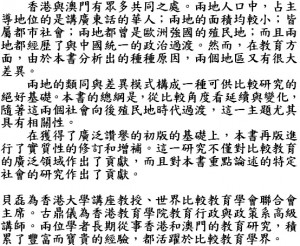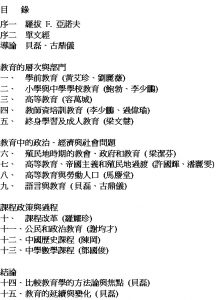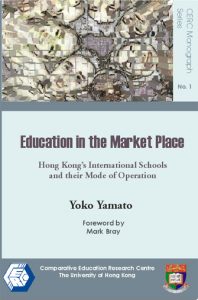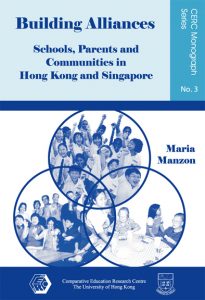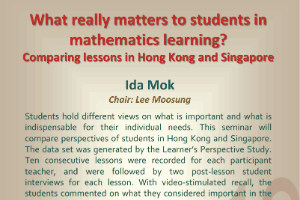Return to the CERC Studies in Comparative Education.
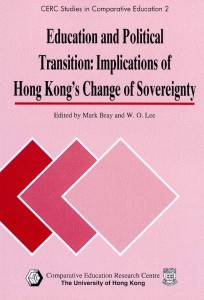 Mark Bray & W.O. Lee
Mark Bray & W.O. Lee
1997, 169pp
ISBN 10: 962-8093-90-8
ISBN 13: 978-962-8093-90-8
HK$100 (local), US$20 (overseas)
Published by Comparative Education Research Centre (CERC)
Preview on Google Books
Buy online
Mark Bray and W.O. Lee have co-edited a special number of the journal Comparative Education (Vol.33, No.2, 1997) on the implications for education of Hong Kong’s political transition. The special number will be published in June 1997, i.e. almost exactly at the time of the change of sovereignty. Subsequently it will be re-published in book form in the series ‘CERC Studies in Comparative Education’, thereby making it readily available to individuals and institutions which do not subscribe to the journal.
Abstracts of the contributions to the Special Number are as follows:
Editorial Introduction (Mark Bray & W.O. Lee)
The Editorial Introduction places the special number in the context of broader literatures on (a) education and political transition worldwide, and (b) political transition and social change in Hong Kong. It also highlights the conceptual contributions of the papers that follow, and shows how they can be linked to each other.
Education and Colonial Transition: The Hong Kong Experience in Comparative Perspective (Mark Bray)
While in some respects the nature of Hong Kong’s colonial transition seems unique, several parallels exist with transitions elsewhere. This paper begins by identifying major differences and similarities in the macro-framework. It then turns specifically to the education sector, noting that the parallel operation of multiple education systems within the boundaries of a single country is quite common, and therefore that models already exist for continued plurality of the type that might be envisaged for Hong Kong and the rest of China. Examining changes at various points in time, the paper observes that some reforms were made in Hong Kong’s educational provision well ahead of the commencement of colonial transition, and far in advance of parallel points in the history in other colonies. The paper then turns to specific changes which occurred during the period 1984-97, and to commentary on the further changes that may be expected in the continuing period of transition that commenced in 1997. Analysis of the currents and countercurrents makes Hong Kong an important case to study, both in its own right and as a case to compare and contrast with patterns elsewhere.
Education Policy and the 1997 Factor: The Art of the Possible Interacting with the Dismal Science (Anthony Sweeting)
“The 1997 Factor” has broad and narrow connotations. Its broader sense equates it with concern about Hong Kong’s future. Its narrow sense focuses on attitudes and actions affected by the change of sovereignty over Hong Kong at midnight on 30th June, this year. The present article investigates how both senses have influenced education policy in Hong Kong and, in particular, how resulting policy developments have reflected considerations of politics (the art of the possible) and economics (the dismal science). The article is divided into two main parts. The first, larger section offers a broad historical perspective, demonstrating that concerns about the future of the colony of Hong Kong are recurrent and almost exactly as old as the colony itself. The second section focuses briefly on three case studies of educational issues that have arisen recently from ideas related to the resumption of Chinese sovereignty over Hong Kong.
The Accommodation and Resistance to the Decolonisation, Neocolonisation and
Recolonisation of Higher Education in Hong Kong (Law Wing Wah)
This article identifies the impact of the political transition on the Hong Kong higher education system during the transitional period between 1982 and 1997. The struggles among the departing and incoming sovereign powers and local groups are also examined. The article argues that, during this period, three related colonial transition processes — decolonization, neo-colonization and recolonization — coexisted in Hong Kong higher education within the framework of one country and two systems. These processes further initiated spectra of their acceptance and resistance by the three major actors. On different occasions, the local government and groups played different, or even contradictory, roles: decolonising, neo-colonising or recolonising agents. They selectively participated in the three processes so as to create facilitating conditions for and obstacles to the control of higher education by the incoming ruling power in the post-1997 era.
Church, State and Education: Catholic Education in Hong Kong during the Political Transition (John Kang Tan)
Roman Catholic schools represent an important sector in Hong Kong’s education system, in both number and historical significance. As in many colonies in other periods of history, the Roman Catholic Church, in addition to other Christian churches, had a partnership relationship with the colonial government in the provision of education in Hong Kong. Was there any change in this relationship during the political transition to 1997? Has the prospective return of Hong Kong to the People’s Republic of China affected Catholic educational policies? This article examines these two questions in relation to the experience of other places in the world, and in relation to the special nature of the Catholic Church in Hong Kong, namely its link with the Vatican and its relations with China where church schools no longer exist.
Language and the Curriculum in Hong Kong: Dilemmas of Triglossia (Bob Adamson & Winnie Auyeung Lai)
As with colonial transitions elsewhere, language patterns in Hong Kong have changed with the return of sovereignty to China. Diglossia (whereby Hong Kong Cantonese and English predominate) is shifting to triglossia, as Putonghua, the official language of the People’s Republic of China, has become increasingly important. This paper focuses on the impact of colonial transition, and particularly the emergence of Putonghua, on the language subjects in the primary and secondary school curricula in Hong Kong. It argues that whilst the rationale for promoting Putonghua is logical, tensions are evident in the school curricula, most notably in two areas. Firstly, the curricula were already heavily biased in favour of language subjects, and secondly, the necessary teaching expertise for Putonghua is not readily available.
The Hong Kong School Curriculum and the Political Transition: Politicisation, Contextualisation and Symbolic Action (Paul Morris & K.K. Chan)
This paper uses a historical perspective to analyse the impact on the school curriculum of the return of Hong Kong to Chinese sovereignty. Whilst the transition has relaxed the criteria used by the state to select school knowledge, it has occurred at a time when the selective and allocative role of schooling has become paramount. Consequently, the transition has had a significant impact on the intended curriculum as a result of attempts by the departing colonial government to reform the curriculum. However, these reforms have had a limited impact on the implemented curriculum, which has been more strongly influenced by the emergence of a market in which schools compete for academically more able pupils.
Futuristic Metropolis or Second-Rate Port? Adult Education in Hong Kong before and after 1997 (Roger Boshier)
Despite China’s assurances about ‘one country, two systems’, adult education in Hong Kong is in for some big changes. The author maps the present adult education landscape, reviews research, posits four scenarios concerning the future, and identifies challenges to be faced by adult educators in Hong Kong after 1997. Returning Hong Kong to the bosom of a maoist, marxist-leninist state is not necessarily good news for marxist adult educators. Functionalist orthodoxy will be permitted, but those committed to marxist (critical, emancipatory) approaches to adult education will be in jeopardy because of laws about subversion. Adult education is shaped by the context in which it occurs, and what happens to critical adult educators in Hong Kong after 1997 will signal the extent to which ‘one country, two systems’ is reality or illusion.
Hong Kong’s Change of Sovereignty: School Leader Perceptions of Educational Policy and
School Administration (Clive Dimmock & Allan Walker)
This study captures the thoughts and perceptions of a group of Hong Kong principals on the transfer of sovereignty and its effects on education. The investigation addressed the following guiding research question: What, according to their perceptions, have been, and will be, the effects on education policy and on school-level management and curriculum, of the transfer of sovereignty? A qualitative approach was adopted, using naturalistic methods of inquiry. Nine principals of aided secondary schools were selected for interview according to procedures of purposive sampling. Findings indicate that, faced with uncertainty arising from the change of sovereignty, principals feel confident of managing and coping with situations at the school level in connection with curriculum and management. However, they express concern and greater uncertainty about their ability to manage changes emanating in the broader socio-political educational environment, especially in regard to values and norms and access and opportunity, all of which are likely to impact on their schools.
Education and Colonial Transition in Singapore and Hong Kong: Comparisons and Contrasts (Jason Tan)
As Hong Kong approaches its handover to Chinese sovereignty, it is instructive to compare its experience with that in other former British colonies. This article focuses on how education policies in areas such as medium of instruction and curriculum changed as Singapore moved towards self-government and independence in the 1950s and 1960s. It also compares the changes that took place in Singapore with those currently occurring in Hong Kong. Observations are made about the likelihood of the ‘one country, two systems’ concept working in Hong Kong after 1997.
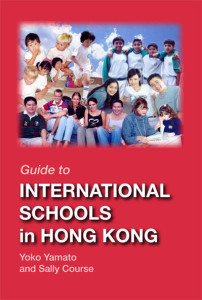 Yoko Yamato and Sally Course
Yoko Yamato and Sally Course

 Ruth Hayhoe
Ruth Hayhoe
 Mark Bray & W.O. Lee
Mark Bray & W.O. Lee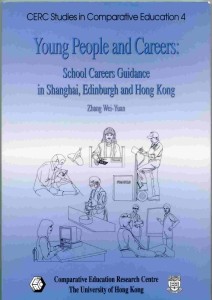 Zhang Wei Yuan
Zhang Wei Yuan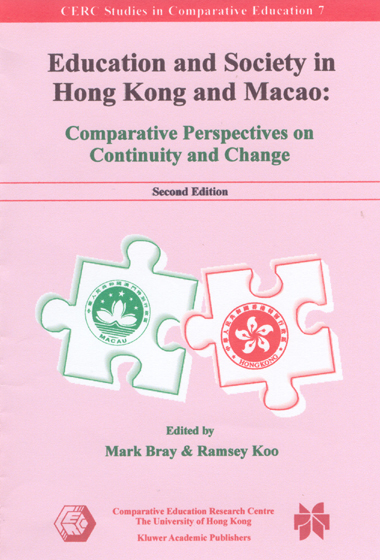 Mark Bray & Ramsey Koo
Mark Bray & Ramsey Koo

